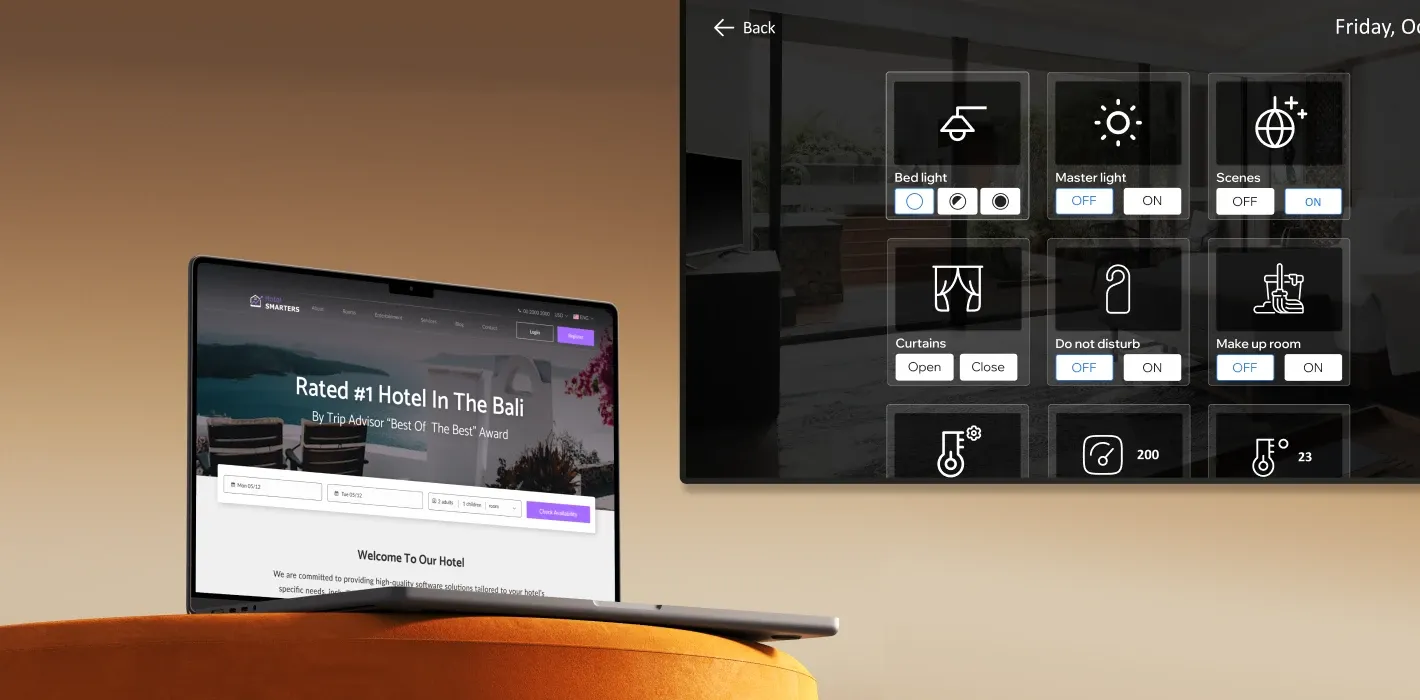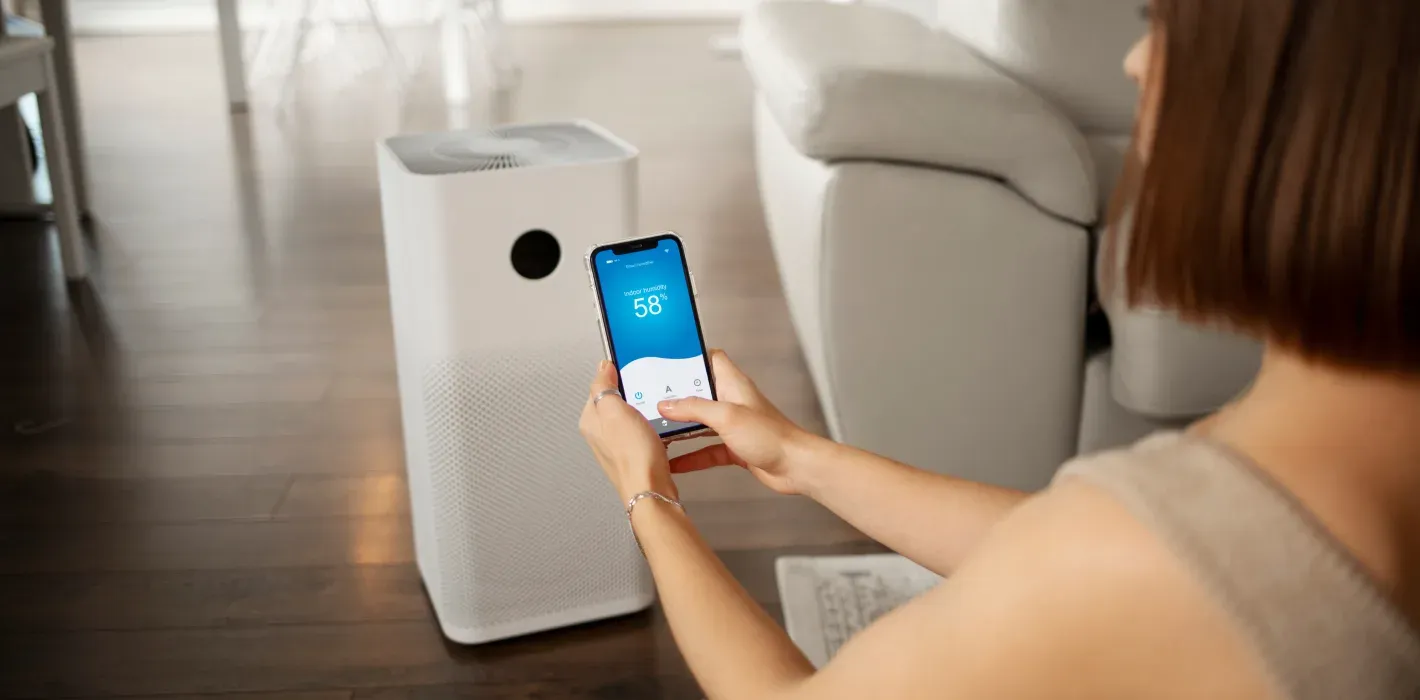

Hotel automation is revolutionizing the hospitality industry by helping hotels reduce costs, enhance guest experiences, and optimize daily operations.
Automated solutions empower hotel staff to boost productivity, minimize errors, and provide guests with a seamless, personalized experience that keeps them returning for more. In this article, we’ll explore how hotel automation can help your business increase efficiency while delivering an elevated guest experience.

Hotel automation involves using technology to automate various functions within your hotel, reducing manual labor and increasing efficiency and the overall stay and comfort of guests. Automation systems streamline hotel operations by managing everything from energy efficiency to booking confirmations and room assignments, ensuring optimal performance with minimal human intervention.
 You can rely on cutting-edge technology to manage mundane tasks such as housekeeping, temperature control, check-ins, and guest service requests. This enables your team to engage with guests in a more exacting and individualized manner.
You can rely on cutting-edge technology to manage mundane tasks such as housekeeping, temperature control, check-ins, and guest service requests. This enables your team to engage with guests in a more exacting and individualized manner.
Using a smartphone app or voice commands, guests can change the lighting and temperature in their rooms with the simple tap of a button. They can also ask for conveniences, including cleaning or maintenance, at will. This enhances the guest experience and simultaneously lowers running expenses, all while minimizing human error in hand-operated procedures.
By integrating automated technologies, hotels can enhance the guest experience, reduce labor costs, and streamline operations—all while increasing profitability.
Daily tasks like maintenance, room service requests, and check-ins are automated, freeing staff to focus on building stronger relationships with guests and ensuring their needs are met. This results in more efficient operations and a more personalized level of service.
One key advantage of hotel automation is its cost-cutting potential. Automated systems handle routine tasks more efficiently and accurately than manual labor, reducing staffing costs and minimizing errors, which lowers overall management expenses.
Smart energy management systems also play a crucial role in cutting costs by optimizing heating, cooling, and lighting based on room occupancy. This not only reduces energy consumption but also lowers utility costs, offering savings for both the hotel and its guests.
Additionally, hotel automation enables better resource management, reduces waste, and further controls expenses. Beyond cost savings, hotel automation significantly enhances the guest experience.
Automated features like smart room controls, mobile check-ins, and AI-driven concierge services offer convenience and personalization. Guests can check in, adjust room settings, and make service requests through a simple smartphone app or voice-activated assistant.
This high level of customization creates a seamless, memorable stay that boosts guest satisfaction, encourages repeat visits, and fosters customer loyalty. Guests are more likely to recommend the hotel to others, driving positive word-of-mouth and long-term success.

Automated check-in and check-out systems allow guests to bypass the front desk, eliminating long lines and unnecessary interactions that could disrupt their schedule. This guarantees a seamless experience from arrival to departure. Guests can remotely select their room after viewing real-time status updates, check in effortlessly, and receive a digital key through kiosks or smartphone apps.
Automated check-out ensures guests can settle their bills quickly and depart with ease. This streamlines the process, reduces the workload for front desk staff, and minimizes issues with demanding clients.
With smart hotel room automation, guests can control in-room features such as lighting, temperature, and entertainment systems using voice commands or smartphone apps, providing comfort and convenience during their stay.
It also lets guests modify the atmosphere of their accommodation to improve energy efficiency and the whole visiting experience. Hotel automation technology can change the temperature of the room in the absence of a guest, saving energy and lowering maintenance expenses, ultimately making hotels more eco-friendly and sustainable.
Using hotel automation solutions to schedule cleaning based on occupancy and guest preferences helps reduce the housekeeping and maintenance-related workload. As guests leave, smart sensors in rooms inform cleaning staff in real time. By tracking equipment performance and alerting staff members when maintenance is needed, predictive maintenance solutions help prevent expensive breakdowns and guarantee that buildings stay in the best shape.
Automation in hotels, like energy management solutions, helps you efficiently monitor and control energy consumption throughout your hotel. Depending on room occupancy, occupancy sensors help systems, including lighting and HVAC, automatically adapt energy use. This supports your sustainability goals, reduces energy waste, and helps lower costs.
Want to access the latest hotel automation solutions tailored to your hotel needs?Contact HotelSmarters. We’re recognized for our expertise in cutting-edge hotel automation technology, helping hotels like yours elevate efficiency and elevate guest experiences.
As a hotel operator, integrating artificial intelligence (AI) and machine learning (ML) into your hotel automation strategy boosts guest satisfaction, streamlines operations, reduces manual labor, and delivers more personalized experiences.
By leveraging data analysis, real-time decision-making, and adaptive technology, AI and ML can increase your hotel’s responsiveness and efficiency by processing large volumes of data.
These technologies analyze guest behavior and preferences to deliver tailored services. AI-driven systems can suggest activities, dining options, or room upgrades based on a guest’s past stays and preferences. Anticipating guest needs in this way helps create a personalized experience that increases customer satisfaction, loyalty, and referrals.
In revenue management, AI applications optimize hotel pricing based on demand, competition, and booking trends. Using machine learning, these systems analyze occupancy rates and provide real-time pricing recommendations, allowing you to adjust rates in response to market conditions, maximize bookings, and stay competitive. Additionally, AI tools can identify patterns and forecast trends, enabling proactive adjustments that drive profitability and guest satisfaction.
AI-powered chatbots and virtual assistants further enhance the guest experience by handling routine interactions such as room service requests and frequently asked questions.
Available 24/7, these hotel automation tools provide instant responses, ensuring guests always have support. Automating these simple tasks frees up staff to focus on more complex guest needs, reducing their workload and improving service quality.
Modern hotel management depends on automating security and safety to ensure a safe environment for staff and guests at all times. Hotel automation technology will help your organization manage crises and prevent security breaches.
Using automated solutions, such as smart locks, environmental sensors, and surveillance systems, will help lower the demand for human supervision while guaranteeing a higher degree of security.
Hotel door lock systems, for instance, let guests access their rooms with keycards or smartphone apps, enabling keyless entrance. By tracking room access in real time and quickly deactivating lost keys, this improves security and guest convenience.
AI-powered automated surveillance systems can spot odd behavior and notify your security staff of possible risks before they become more serious. These devices can be coupled with motion-detecting or facial recognition software to improve accuracy and response times.
Environmental sensors are another valuable instrument for automating security and safety. These sensors immediately warn your staff upon detecting smoke, gas leaks, or water damage, ensuring quick management of dangers.
Hotel automation technology also facilitates faster emergency reactions. In the event of an emergency, like a fire, guests may receive a notification on their cell phones to evacuate, and exit doors can be quickly unlocked.
As technology evolves, hotel automation will become an essential part of hotel operations, offering seamless, highly personalized experiences while optimizing processes and cost control. A key trend shaping the future of hotel automation is the growing use of artificial intelligence (AI) and machine learning (ML). As these technologies advance, your hotel’s systems will improve at automating tailored services, predicting guest preferences, and managing resources efficiently.
 By analyzing large amounts of guest data in real-time, AI can anticipate needs, such as preferred room settings or meal orders, before guests even make a request. This results in a more seamless and enjoyable experience. Another game-changer in hotel automation is the rise of robotics. From autonomous cleaning devices handling housekeeping tasks to robotic assistants delivering amenities, robots are expected to reduce manual labor while improving service quality.
By analyzing large amounts of guest data in real-time, AI can anticipate needs, such as preferred room settings or meal orders, before guests even make a request. This results in a more seamless and enjoyable experience. Another game-changer in hotel automation is the rise of robotics. From autonomous cleaning devices handling housekeeping tasks to robotic assistants delivering amenities, robots are expected to reduce manual labor while improving service quality.
These robots work continuously, efficiently performing tasks like cleaning, luggage transport, and food and beverage delivery with speed and precision. As a result, they lighten the workload for staff and enhance the guest experience by providing consistent and timely service.
Hotel automation transforms the hospitality industry by improving efficiency, enhancing guest experiences, and optimizing business processes. As technology advances, automation helps hotels stay competitive, reduce costs, and deliver seamless, personalized services to guests.
Hotel automation is set for significant growth with innovations like artificial intelligence (AI), the Internet of Things (IoT), smart devices, and predictive maintenance. Adopting these technologies ensures your hotel keeps pace with industry trends while streamlining operations.
Contact HotelSmarters to explore the latest hotel automation solutions. We specialize in integrating cutting-edge automation technologies into the hospitality sector, helping hotels stay ahead of the curve.
Hotel automation is the process of automating manual tasks like check-in/check-out, room access, lighting, temperature control, housekeeping notifications, and energy management. It offers greater convenience, personalization, and seamless service delivery.
Hotel automation solutions help hotels customize their offerings, improve operational effectiveness, and reduce costs, boosting their competitiveness and ability to meet the growing needs of modern guests.
Additionally, these systems facilitate data-driven decision-making, allowing hotels to adapt quickly to market trends and guest preferences, ultimately increasing guest satisfaction and loyalty.
Future use of artificial intelligence in the hotel sector will be shaped by its capacity to increase operational efficiency, maximize income management, and offer tailored guest experiences.
Furthermore, AI's ability to analyze vast amounts of data will enable hotels to predict trends, streamline processes, and enhance personalization, creating a more seamless and engaging experience for guests. As technology evolves, AI will also play a crucial role in automating routine tasks, freeing up staff to focus on higher-level service and guest interaction.
Co-founder / CTO
Armen is the CTO and Co-Founder of inoRain OTT and Co-Founder of HotelSmarters, specializing in advanced streaming technologies, OTT strategy, and interactive TV systems. He builds scalable end-to-end video delivery solutions and drives technical innovation across hospitality and streaming platforms, bridging complex engineering with practical business impact.